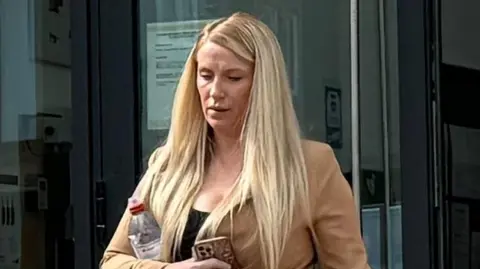In a startling incident that shocked the small village of Crimond in Aberdeenshire, a woman named Sophie-Leigh Gemmell allowed a young girl, under the age of ten, to drive a car. This reckless behavior led to legal repercussions for the 32-year-old, who was subsequently ordered to carry out a community payback order, specifically tasked with 134 hours of unpaid labor. The court’s directive reduced the initial requirement of 200 hours due to Gemmell’s guilty plea for culpable and reckless conduct. The incident, which took place on July 10 of the previous year, was captured on video and quickly circulated on social media, further amplifying the public’s outrage.
During the court proceedings held at Peterhead Sheriff Court, it was revealed that the child, who was barefoot and driving in poor weather conditions, struggled to see over the steering wheel. The footage from the incident showed the girl operating the vehicle while using the windshield wipers and indicators, highlighting her lack of experience and understanding of safe driving practices. The court also noted that the roads were hazardous, with large areas of standing water present, making the situation even more dangerous. Reports indicated that Gemmell was heard on the video cheering for the child while she attempted to drive, showing an alarming disregard for the potential consequences of her actions.
When police arrived at Gemmell’s residence in response to the incident, she reportedly acknowledged her wrongdoing by saying, “Is this about the driving thing? I shouldn’t have done it.” This admission underscored the gravity of her actions and the inherent risks involved in allowing a child to operate a vehicle. The court’s focus on her behavior was reinforced by testimony regarding the reckless nature of her decision, which not only put the child in harm’s way but also endangered others in the vicinity.
Sheriff Annella Cowan, who oversaw the case, originally deferred sentencing to obtain a comprehensive criminal justice social work report, reflecting the judicial system’s attempt to take a holistic view of Gemmell’s situation. Ultimately, during the sentencing phase, Sheriff Alan Sinclair described her conduct as “reckless in the extreme,” stating that she was fortunate that the situation did not result in more serious consequences for either the child or the community at large. In light of her remorse, as expressed in court, the judge decided on the community service sentence, mandating its completion within a timeframe of 12 months.
This incident has raised significant discussions regarding parental responsibilities and the implications of permissive parenting, especially in circumstances involving the safety of minors. The decision to allow a young child to drive a vehicle on public roads, particularly in adverse weather conditions, has sparked debate on where the boundaries lie in encouraging independence versus ensuring safety. The repercussions faced by Gemmell serve as a stark reminder of the responsibilities that accompany parenting and the necessity of prioritizing safety in all situations.
Overall, the case of Sophie-Leigh Gemmell serves as an alarming illustration of how reckless choices, particularly those impacting child welfare, can lead to severe legal consequences and community backlash. As communities continue to grapple with the increasing presence of technology that can capture and broadcast such incidents in real time, a collective reflection on responsible parenting practices and community safety is called for, along with an examination of the broader implications of such behaviors.












